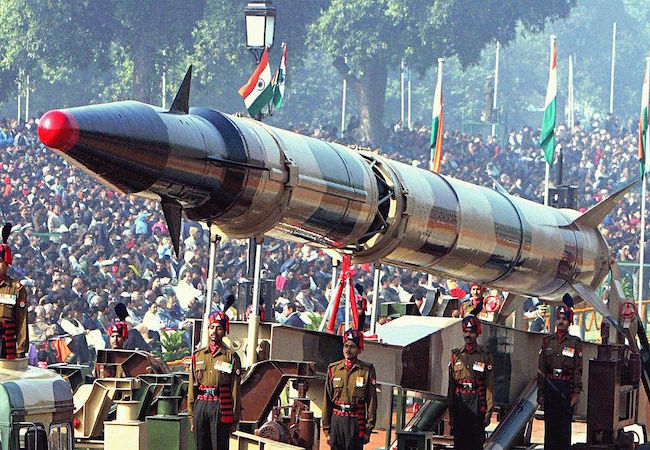
By Shahzadi Tooba Hussain Syed
India has test fired nuclear capable Agni-V with a range of 5,000 km. The interesting part of the India’s accompanying statement is that the missile is test fired after a gap of two years under the self-stated restraint for seeking entry into the 48-country nuclear suppliers group.
Related to India’s entry seeking struggle: on 6 December 2016, Ambassador Rafael Mariano Grossi, the former chair of Nuclear Suppliers Group who is a facilitator, on behalf of the NSG chair presented a proposal consist of nine points for NSG membership. It has been observed by International community that these points are suitable to India but not Pakistan. If Grossi’s criteria is adopted then India can claim that it has already taken all measures according to NSG guidelines, while leaving Pakistan on disadvantage.
According to these suggestive points by Grossi, a country should:
- Implement and have brought into force a clear and strict separation of current and future civilian nuclear facilities from non-civilian nuclear facilities in the non-NPT applicant.
- Have provided and maintain a declaration to the IAEA that identifies all current and future civilian nuclear facilities in the non-NPT applicant.
- Have in force a safeguards agreement with the IAEA covering all declared civilian facilities in the non-NPT applicant and all future civilian facilities which the IAEA and non-NPT applicant determine are eligible for safeguards.
- Have in force with the IAEA an Additional protocol covering the identified civilian nuclear facilities, which together with a safeguards agreement, allows the IAEA to detect the diversion of safeguarded nuclear material and to ensure that safeguarded nuclear material is used exclusively for peaceful purposes.
- A commitment not to use any item transferred either directly or indirectly from a NSG Participating Government or any item derived from transferred items in unsafeguarded facilities or activities.
- A commitment not to conduct any nuclear explosive test.
- A clear description of the non-NPT applicant’s intentions plans, and policies in support of the Comprehensive Test Ban Treaty upon becoming a Participating Government.
- A commitment to support and strengthen the multilateral non-proliferation and disarmament regime by working towards the total elimination of nuclear weapons and enhancing the peaceful uses of nuclear energy.
- An understanding that due to the unique nature of the non-NPT Party applications, non-NPT applicant would join a consensus of all other Participating Governments on the merits of any non-NPT Party application.
These points by Grossi except one point of CTBT, favor India the most suitable candidate to enter into the NSG, while Pakistan will take time to adopt this criteria, and if Pakistan tries to fulfill all the criteria after being India’s membership, India won’t let Pakistan into the NSG. Adopting Grossi’s formula and granting membership to India will be a major setback to non-proliferation regime as membership will provide it access to latest nuclear related infrastructure and technology which will enable India to commercialize the manufacturing of nuclear power plants as well as it will permit the India to enhance vertical proliferation and disturb the balance of power and regional stability. In the light of these scenarios, ideally NSG states must address the above mentioned challenges as well as complex proliferation dealings and networks of India that evade multilateral trade controls along with the most pressing issue of discriminatory approach towards Pakistan.
The linkage and relevance between NSG and Agni V was a part of Indian statement. India made a statement that we had a two year restrained and we don’t fire Agni V, irrespective of our non- proliferation regime of which NSG is an important part. Another point of relevance which is expressed by Ms Tanzeela Khalil, a defence analyst, is about India’s joining of Hague Code of Conduct, which is considered to be a supplementary arrangement for MTCR. If India becomes a member of the Missile Technology Control Regime, its membership in the group is going to facilitate its missile and space program and could possibly ease its way into the NSG. And if these Missiles are deployed on Indian soil in the range of Pakistani Ballistic Missiles and other such weapons, India will like to have a weapon which is outside to that targeting system. Agni is that type of weapon that can be deployed in the Pacific especially on the eastern side of the Pacific. Agni V that’s why becomes very useful weapon for India to be deployed against Pakistan. Agni V is a symbol of great powers and India looks like striving for a great power by all its intentions whether its lobbying to enter into NSG or creating deterrence in the region with these ballistic missile tests and involving all the other major International powers.




